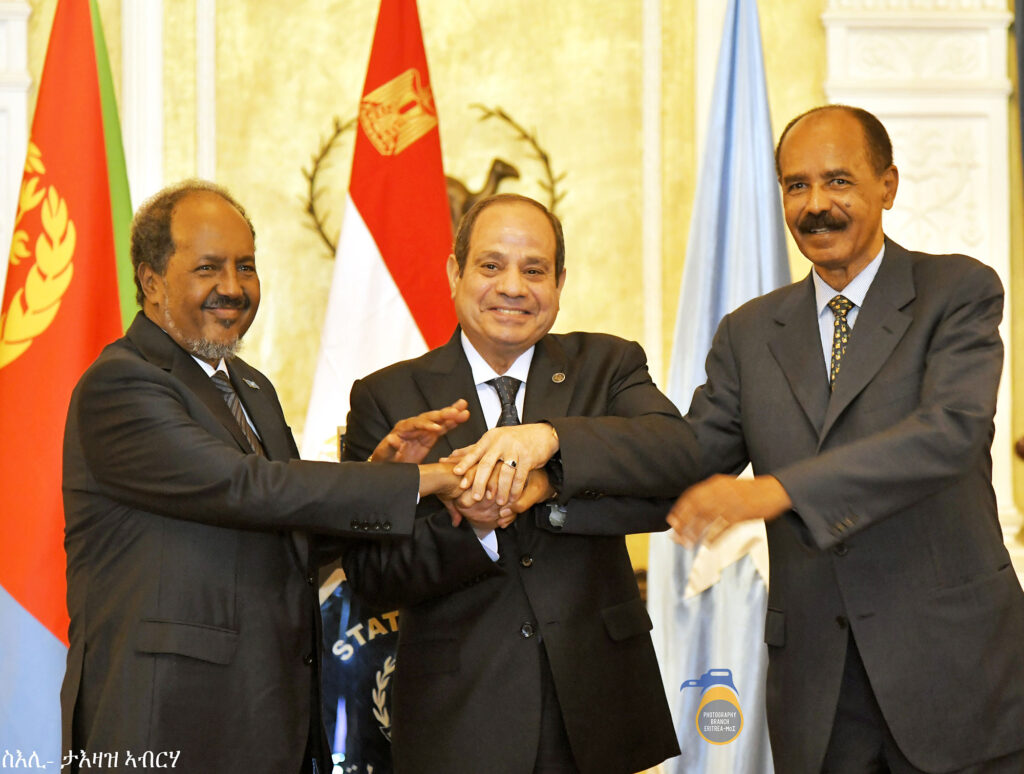ADF STAFF
A new multinational security partnership is threatening to shift the balance of power in the Horn of Africa.
Eritrean President Isaias Afwerki hosted Egyptian President Abdel Fattah al-Sisi and Somali President Hassan Sheikh Mohamud in the Eritrean capital of Asmara on October 10 and announced an alliance.
In a joint statement, the three said they agreed to “enhance the Somali state institutions to confront various internal and external challenges and to enable the Somali National Federal Army to confront terrorism in all its forms.”
In Ethiopia, the trilateral security agreement was met with an uneasy, defensive posture.
“This is an axis against Addis Ababa,” Hassan Khannenje, director of the Horn International Institute for Strategic Studies, told the BBC. “I think it’s an attempt to bring the hate together in trying to increase pressure against Addis Ababa.”
Somali Information Minister Daud Aweis, however, insisted that the meeting was only about co-operation among the three countries.
“We are not determined to instigate anything against Addis Ababa,” he told the BBC. “Addis Ababa is our neighbor. We have been co-operating together for a long time, although later on their leadership came up with a factor of instability in the region.
“But still we stand for peace, and we don’t think that such a meeting in Asmara has anything to do with Ethiopia.”
Access to the Nile River and the Red Sea are the focal points of disputes between Ethiopia and its neighbors.
Somalia and Ethiopia have been locked in a diplomatic row over a Red Sea port deal Ethiopia signed with the breakaway territory of Somaliland, which Somalia considers part of its nation.
Egypt’s primary issue with Ethiopia is control over the flow of the Nile, which it believes the Grand Ethiopian Renaissance Dam has diverted.
These crises, seen as existential in Egypt and Ethiopia, have spurred the latest round of posturing and intensifying rhetoric.
Samir Bhattacharya, an associate fellow at Observer Research Foundation who studies African geopolitics, warns that the Horn is “rapidly becoming a tinderbox.”
“An anti-Ethiopian tripartite group is already a diplomatic victory for Egypt,” he wrote in The Diplomatic Courier magazine on October 24. “However, other than security assistance from Egypt, both Somalia and Eritrea stand to gain little from this arrangement.
“With existing tensions between Somalia and Ethiopia already elevated, this strategic shift could further exacerbate instability within Somalia.”
Despite the rising temperature in the region, Dr. Mohamed ELDoh is among the defense and security analysts who does not believe the saber-rattling will lead to regional military conflict.
“The establishment of the Egypt-Eritrea-Somalia alliance marks a crucial change in the geopolitics of the Horn of Africa,” he wrote in an October 23 situation report for Geopolitical Monitor. “As Ethiopia continues to assert itself as a regional power, its neighbors are seeking to counterbalance Addis Ababa through diplomatic and military means.”

